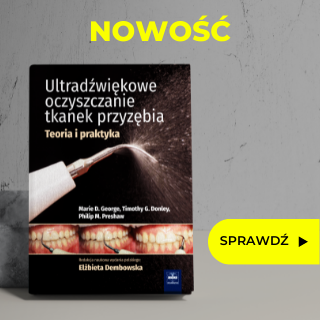Dostęp do tego artykułu jest płatny.
Zapraszamy do zakupu!
Po dokonaniu zakupu artykuł w postaci pliku PDF prześlemy bezpośrednio pod twój adres e-mail.
Influence of Coenzyme Q10 on changes in cytological smears taken from the bottom of periodontal pockets in patients with periodontal disease
Wstęp. W trakcie choroby przyzębia dochodzi do masowej migracji granulocytów obojętnochłonnych do dziąsła i nadprodukcji wolnych rodników (ROS) i w konsekwencji rozwoju stanu zapalnego. Koenzym Q10, będąc zmiataczem wolnych rodników, ma działanie antyoksydacyjne i przeciwzapalne.
Cel pracy. Ocena skuteczności CoQ10 w leczeniu chorób przyzębia, a także stwierdzenie, czy miejscowe stosowanie żelu z CoQ10 spowoduje zmiany w rozmazach zeskrobin z dna kieszonek przyzębnych.
Materiał i metody. Pacjentom cierpiącym na przewlekłe i agresywne zapalenie przyzębia podawano początkowo przez 2 miesiące wazelinę (placebo), a następnie przez taki sam okres żel z CoQ10. Na poszczególnych etapach eksperymentu oceniano głębokość kieszonek przyzębnych i wskaźnik PDI oraz mikroskopowo rozmazy z dna kieszonek przyzębnych.
Wyniki. Zarówno u pacjentów z przewlekłą, jak i agresywną chorobą przyzębia stwierdzono spłycenie kieszonek przyzębnych o ok. 0,5 mm i spadek PDI średnio o 1 stopień oraz cechy ustępowania stanu zapalnego w rozmazach cytologicznych.
Wnioski. Żel zawierający koenzym Q10 jest przydatny w terapii przewlekłych i agresywnych chorób przyzębia. Działanie lecznicze tego związku wyraża się zmniejszeniem głębokości kieszonek przyzębnych i istotnym statystycznie spadkiem wskaźnika PDI. Zastosowanie leczenia ubichinonem zmniejsza nasilenie stanu zapalnego potwierdzone badaniem cytologicznym rozmazów z dna kieszonek przyzębnych.
Summary
Introduction. During the course of periodontal disease there is a massive migration of neutrophil granulocytes to the gingiva and an overproduction of reactive oxygen species (ROS) and, in consequence, the development of the inflammatory condition. Coenzyme Q10, being a scavenger of oxygen free radicals, has antioxidant and anti-inflammatory action. Aim of study. Evaluation of the effectiveness of CoQ10 in the treatment of periodontal disease and also to see whether the local application of gel with CoQ10 causes changes in smears from scrapings from the bottom of periodontal pockets. Materials and methods. Patients with chronic and aggressive periodontal inflammation were initially given (for 2 months) vaseline (placebo), and then, over the same period, gel with CoQ10. At particular stages of the experiment, evaluation was made of the depth of periodontal pockets and of the PDI, together with microscope examination of smears from the bottom of the periodontal pockets. Results. Both in patients with chronic and in those with the aggressive form of periodontitis, there were found to be more shallow periodontal pockets, by about 0.5 mm, and a fall in PDI on average by 1 degree and features of a reduction in the inflammatory state. There were features of a recession of the inflammatory state in the cytological smears. Conclusions. Gel containing coenzyme Q10 is useful in the therapy of chronic and aggressive periodontitis. The treatment effects of this relationship are expressed by a reduction in periodontal pockets and a statistically significant drop of PDI index. The use of treatment with ubiquinone reduces the intensity of inflammation and this is confirmed by cytology of smears from the bottom of periodontal pockets.













